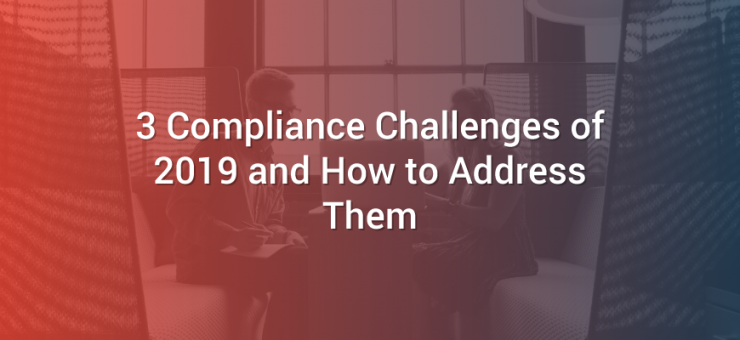One of the most complicated tasks in the world of Human Resources is compliance with employment and HR-related laws. Compared to the last few decades, more employment legislation has been passed and it can also be argued that the laws have become more sophisticated. Most of the laws have to do with diversity, technology, and healthcare.
In this article, we’re going to look into the most important HR compliance challenges of 2019 and how you can address them.
Diversity and Inclusivity
When it comes to diversity, there is a broad spectrum of factors that need to be taken into account by HR professionals. Fundamentally, diversity in the workplace has to do with the differences between the ways people perceive and process information. Factors like race, ethnicity, religion, physical abilities, and sexual orientation create these differences.
One of the challenges that HR departments have to deal with the context of diversity and inclusivity are the cultural and physical sensitivities associated with a particular group of employees. When it comes to the working environment, it’s essential to be inclusive of each individual’s cultural or ethical food limitations. Whether they’re Muslim or vegan — they need to work in an environment that takes their choices into account.
The same goes for people with physical, intellectual, or developmental disabilities.
How to address diversity and inclusivity issues
- Develop a diversity strategy at the highest levels of your organization.
- Train and inform workers about unconscious bias
- Assign a C-Suite executive to be responsible for leading diversity initiatives
Addressing Employee Leave
Leave laws are another fairly complex domain that HR specialists need to approach meticulously. Laws and regulations regarding employee leaves can fluctuate, depending on a set of factors like the total number of employees and the state it’s located in. According to a report published by XpertHR:
- Nearly half of employers find keeping track of all the changes on leave legislation extremely challenging
- Nearly 45% found it extremely complicated to handle leaves
- Little over 40% find it very complicated to establish which state, local, or federal laws apply to specific employees when it comes to leave benefits
The vast majority of organizations need to comply with a broad set of leave laws that regard sick leave, bereavement leave, blood donor leave, domestic violence leave, and many others.
How to address employee leave?
It’s evident that there’s no “magic trick” that will help employers make the right decisions at all times, except for actually remaining thoroughly informed on the topic at hand.
However, what businesses can and should do is first establish all the laws their organization is subject to and then explicitly describe the types of leave their employees are entitled to via handbooks, brochures, workplace notices, and posters.
Employee benefits
Issues surrounding benefits and employee health and wellness are also known for being challenging for HR. There is a broad set of laws that can be complicated to comply with, due to their complexity. Such laws include:
- Affordable Care Act (also known as Obamacare)
- Genetic Information Nondiscrimination Act
- Consolidated Omnibus Budget Recognition Act (also known as COBRA)
- Americans with Disabilities Act
The Affordable Care Act, is especially problematic, given that the Trump administration has promised to repeal it. However, employers still have to comply with these laws to avoid fines and penalties.
How to address benefit-related challenges?
Among the most problematic facets of employee benefit compliance is undoubtedly handling mental health issues within the organization’s staff. The above-mentioned XpertHR study suggests that 48% of surveyed employers found this aspect extremely or very challenging.
“Employers need to realize that their actions have an immediate effect on their workers’ mental health,” — Jeremy Meyer, an HR specialist at Top Writers Review. “Similarly, if a company already has staff that has a history of mental illness, it’s very important to accommodate them by offering altered work and special break schedules.”
An organization’s benefit package needs to be subject to regular review so that it’s in sync with these strategies. A company’s package needs to be compared to the ones provided by competitors in order to stay competitive in the job market.
It is imperative to regularly update your benefit package in accordance with the interests of all the age groups that are part of your company. Businesses need to invest time and effort into creating strategies that will allow personalization of each employee’s benefits.
Conclusion
There’s no doubt HR compliance is an arduous task. To some extent, workers rely on the HR departments to enact the legislation passed to make their life better.
Good luck!
About the Author
 Sylvia Giltner is a career coach, HR specialist at ResumesCentre. Her passion is to help people make career changes and get jobs they truly love by showing them how to take full control over their careers. She is also an active guest contributor. Sylvia’s writing has been featured on Forbes, Fast Company, Glassdoor, TLNT and more.
Sylvia Giltner is a career coach, HR specialist at ResumesCentre. Her passion is to help people make career changes and get jobs they truly love by showing them how to take full control over their careers. She is also an active guest contributor. Sylvia’s writing has been featured on Forbes, Fast Company, Glassdoor, TLNT and more.











